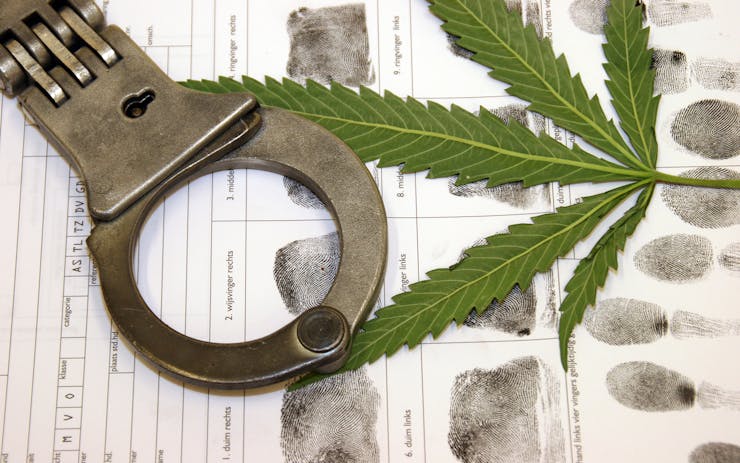Pressure is mounting on the Netherlands to take action in the tragic case of Dutch coffeeshop pioneer Johan van Laarhoven, who faces a 103-year jail sentence in Thailand despite never having committed a crime in that country.
Van Laarhoven, 56, was one of the first coffeeshop owners to open an establishment in the south of the Netherlands. Beginning in the early 1980s, he developed his tiny coffeeshop into a four-store chain, The Grass Company, with locations in his hometown of Tilburg and nearby Den Bosch. He moved to Thailand in 2008 and retired in 2011.
Then, on July 24, 2014, disaster struck. In a massive raid broadcast live on Thai television, police arrested Van Laarhoven and his wife, Tukta, separating them from each other as well as from their two small children. They’ve been in jail ever since.
The story behind the arrest reads like a Hollywood script. Dutch authorities had been investigating Van Laarhoven and The Grass Company since 2011 but had yet to succeed in building a case with evidence that would hold up in court. His lawyers and family suspect that, frustrated by the lack of success, Dutch prosecutor Lucas van Delft tipped off the Thai authorities to Van Laarhoven’s past.
The prosecutor initially denied the allegation, but eventually crucial evidence came to light. In a letter to the Thai public prosecutor dated July 14, 2014, the drug liaison at the Dutch embassy in Bangkok asked Thai authorities to open a case against Van Laarhoven for illegal drug dealing. The move struck many as questionable in light of the fact that, just two months earlier, a military junta had seized power in Thailand after a coup and had dissolved the constitution. Roughly a week after the letter was sent, Van Laarhoven’s home was raided.
In a twist, prosecutor Lucas van Delft was removed from his cases earlier this year following revelations that he had fabricated death threats against himself.
Gerard Spong, one of Holland’s top criminal lawyers, currently leads Van Laarhoven’s defense. He’s tried to explain to judges in Thailand that selling cannabis in Holland is legally permitted under strict conditions. Van Laarhoven met all these conditions. His coffeeshops have been — and still are — scrutinized by the Dutch authorities. The only rule The Grass Company breaks is the one that nearly all coffeeshops run into: a 500-gram limit on any coffeeshops’s stock. Judges have ceased issuing criminal sentences for this “crime,” however, as in recent years they’ve come to understand it’s impossible to run a coffeeshop without a reasonable amount of stock on hand.
But the efforts to persuade the Thai judges fell flat. On Nov. 10, 2015, Van Laarhoven was sentenced to 103 years behind bars. His wife Tukta, who never had anything to do with his business, was slapped with an 18-year term.
Ever since the arrest, Van Laarhoven’s brother, Frans van Laarhoven, has worked tirelessly to bring media and politicians’ attention to the situation. And a campaign, Justice for Johan, is gathering signatures to petition officials to bring Van Laarhoven back to the Netherlands for a fair trial.
Leafly spoke with Frans van Laarhoven to discuss his brother’s plight. Here’s an edited transcript of the conversation.
Leafly: Your brother’s begun serving his 103-year sentence in a Thai jail. Can you tell us how he’s doing?
Frans van Laarhoven: Physically things are steadily getting worse, because Johan is still denied proper medical treatment. Conditions in his cell are very tough. Sleeping on the floor without a mattress, the lack of drink and food during the 15 hours a day he’s locked up with 50 people in a space less than 50 square meters [about 540 square feet]. He has lost 35 kilos [77 pounds], but his fighting spirit hasn’t left him yet. Johan is primarily concerned about his wife, who is also an innocent prisoner, and their two children. It’s hard to imagine how both of them have survived for over two years in the “Hell of Bangkok.”
What surprises you most of all the events surrounding Johan’s arrest and trial?
The extradition by the Netherlands to Thailand. A planned scenario! The fact that you are sentenced to 103 years in prison for something that is permitted in the Netherlands— Every euro that my brother invested in Thailand is accounted for fiscally, and still a Thai court convicts him for “laundering” money he has earned legally in the Netherlands.
The latest news is that the police officers and prosecutor involved in the case will testify under oath in a Dutch court in September and October. Why is this important?
Only in this way, hopefully, the truth will come out and we can expose and denounce the scandalous actions of the Dutch government.
Eight political parties have now asked the government to take action. Do you expect they will?
I don’t know. So far, the Dutch government has not taken its responsibility. Johan is framed and cheated rather than helped. Why is this? What do they have to hide? Why did the former prosecutor Lucas van Delft do the things he did? Why did he think Johan — and also Tukta — had to hang in Thailand? Is it because a prosecution in the Netherlands would have failed?
More information, visit the Justice for Johan website, available in English and Dutch.





